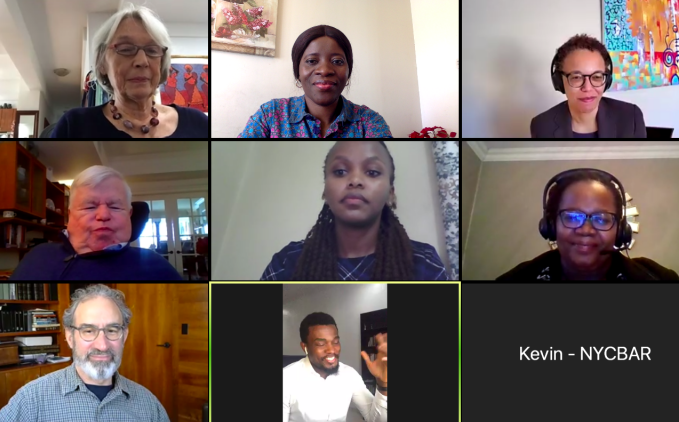This website uses cookies so that we can provide you with the best user experience possible. Cookie information is stored in your browser and performs functions such as recognising you when you return to our website and helping our team to understand which sections of the website you find most interesting and useful.
Vance Center Launches African Legal Fellows Webinar Series
February 2021
The Vance Center launched a bi-monthly webinar series to present the African Legal Fellows program, discuss topical issues and set the pace for the program’s 20th anniversary next year.
The launch event entitled ‘Supporting Young Lawyers in sub-Saharan Africa’ highlighted the origins, mission, benefits, and future of the African Legal Fellows program through the lenses of some of its founders and alumni. Inosi Nyatta, the co-Chair of the Vance Center Committee Africa Sub-Committee and partner at Sullivan & Cromwell, moderated the event with 69 participants from Africa and the United States.
Evan Davis, Senior Counsel at Cleary Gottlieb and Vance Center Committee member emeritus, and Joan Vermeulen, the founding Executive Director of the Vance Center, recollected their vision for what was initially the South African Visiting Lawyers program at the beginning of South Africa’s democracy to promote a more racially-inclusive legal profession. They explained how in early visits to the country, they built relationships with lawyers eager to learn more about transactional work across borders and convinced New York law firms to take on fellows.
Nontu Made, a 2005-2006 fellow and the current chairperson of the South African Legal Fellows Network (SALFN), explained the impact of the fellowship on South African lawyers and the formation of SALFN with more than 45 alumni, mentoring high school and law school students, and junior lawyers of color. She described the process when she applied in 2005, along with other young lawyers who had finished their legal apprenticeship or law articles.
Joba Akinola, the first fellow from Nigeria and a senior associate at Olaniwun Ajayi LP, and Rosemary Maina, the first fellow from Kenya and senior associate at Anjarwalla & Khanna LLP, described the most remarkable experiences they had working in New York law firms and offered advice for lawyers considering the program.
The three alumni compared working in New York and South Africa, Kenya, and Nigeria: the similarities in the legal frameworks and transactions and the differences in staff size and the administrative support available at the New York law firms. They also explained what they had gained from the program and passed along to their colleagues and law firms.
Nyatta and the other panelists reviewed the key considerations for the U.S. law firms in deciding to participate in the program and the benefits for the law firms in Africa that lend their associates for the fellowship period. The panel session concluded with a review of the impact of COVID on the program, possibilities of expanding to other countries, unprecedented ways of communicating by video conference across vast geographies, and the next steps for the program.
The African Legal Fellows program started in 2002 when Evan Davis traveled to South Africa to find ways to address the legacy of apartheid in the South African legal profession. The program, which more recently has expanded to include lawyers from Nigeria, Kenya, and Ethiopia, has brought 60 African lawyers to spend up to a year as international associates in major New York City law firms and corporate legal departments. In light of the restrictions posed by the Covid-19 pandemic and U.S. visa regulations, the Vance Center will hold bi-monthly webinars with Africa Legal Fellows’ alumnae/i to provide information about the program and discuss topical issues in Africa for its 2020-2021 session.


